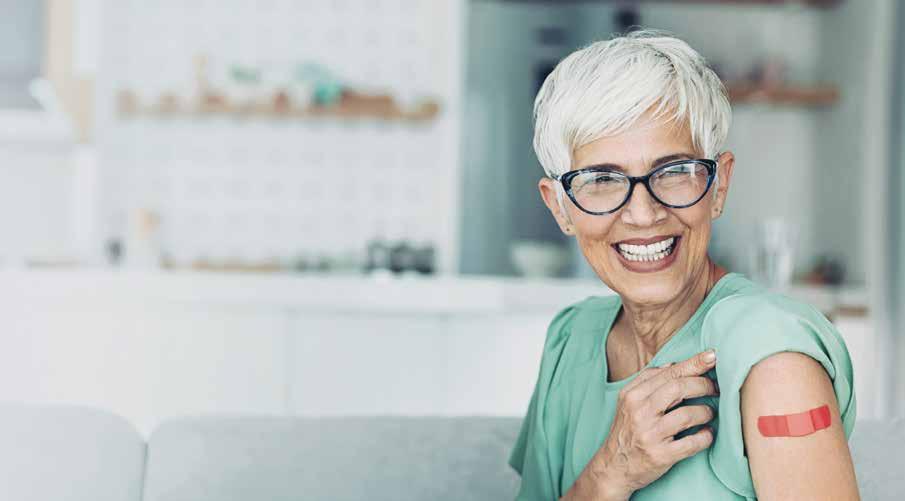




Women in Health Women’s















READ THE WASHINGTON INFORMER YOUR WAY:
n In Print – feel the ink between your fingers of our Award Winning Print Edition
n On the Web – www.washingtoninformer.com updated throughout the day, every day
n On your tablet
n On your smartphone
n Facebook
n Twitter
n Weekly Email Blast – sign up at www.washingtoninformer.com

202-561-4100


For advertising contact Ron Burke at rburke@washingtoninformer.com ...Informing you everyday in every way

In Memoriam
Dr. Calvin W. Rolark, Sr. Wilhelmina J. Rolark
PUBLISHER
Denise Rolark Barnes
THE WASHINGTON INFORMER
NEWSPAPER (ISSN#0741-9414) is published weekly on each Thursday. Periodicals postage paid at Washington, D.C. and additional mailing offices. News and advertising deadline is Monday prior to publication. Announcements must be received two weeks prior to event. Copyright 2016 by The Washington Informer. All rights reserved. POSTMASTER: Send change of addresses to The Washington Informer, 3117 Martin Luther King, Jr. Ave., S.E. Washington, D.C. 20032. No part of this publication may be reproduced without written permission from the publisher. The Informer Newspaper cannot guarantee the return of photographs. Subscription rates are $55 per year, two years $70. Papers will be received not more than a week after publication. Make checks payable to:
THE WASHINGTON INFORMER
3117 Martin Luther King, Jr. Ave., S.E Washington, D.C. 20032
Phone: 202 561-4100
Fax: 202 574-3785
news@washingtoninformer.com www.washingtoninformer.com
STAFF
Micha Green, Managing Editor
Ron Burke, Advertising/Marketing Director
Shevry Lassiter, WIN-TV Producer
Ra-Jah Kelly, Digital Asset Manager
Lafayette Barnes, IV, Editor, WI Bridge DC
Desmond Barnes, WIN Daily Editor
Anthony Tilghman, Social Media Strategist
ZebraDesigns.net, Graphic Design
Mable Neville, Bookkeeper
Angie Johnson, Office/Circulation Manager
REPORTERS
Stacy Brown, National Reporter
Sam P.K. Collins, Political/Education Reporter
Zerline Hughes, Housing Reporter
Brenda Siler, Lifestyle Reporter
Lindiwe Vilakazi, Health Reporter
Ed Hill, Sports Reporter
Jada Ingleton, WI Comcast Fellow, WIN Daily Newsletter Editor
Eden Harris, Reporter
PHOTOGRAPHERS
Shevry Lassiter, Photo Editor
Ja Mon Jackson, Asst. Photo Editor
Roy Lewis, Jr.
Robert R. Roberts
Anthony Tilghman
Abdullah Konte
Cleveland Nelson
INTERNS
Skylar Nelson, Howard University
Tait Manning, Howard University

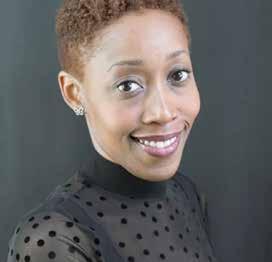
Lindiwe Vilakazi WI Health Reporter
Happy Women’s History Month!
Every year, March is dedicated to honoring the accomplishments and breakthroughs of trailblazing women across the world who have laid foundations for those walking behind them.
Despite the challenges many women face in terms of health disparities and rights, there are those working to combat issues, fight toward justice and uplift women’s wellness in the District of Columbia, nation and world.
According to the Bureau of Labor Statistics, in 2021 “16.4 million women were employed in the health care and social assistance industry,” making “77.6% of the total 21.2 million workers in the industry.”
When examining the industries that make up health care and social assistance, women account for roughly 84% of total employment (2.6 million) in social assistance, 75% of total employment (5.2 million) in hospitals, and 77.4% of total employment (8.3 million) in health services, except hospitals.
Among women employed in the healthcare industry, a recent study published in Health Affairs shows that Black women are widely represented in this space, as, “more than one in five Black women in the labor force (22.4%) are employed in the health care sector.” Within this demographic, 64.7% work in licensed practical nurse or aide occupations, with 40% working in long-term care, showing health care as a leading employer for Black women.
Further, in the D.C. Metropolitan area, there are a host of women who have made great strides for health equity and improved wellness outcomes in their communities.

While women dominate the health sector across the country, they are in fact the bedrock of quality of healthcare and wellness support for people and their families across the DMV.
In honor of Women’s History Month, The Informer is dedicating this health special edition to overall women’s wellness. Learn about the future of maternal health care east of the Anacostia River as the District prepares to welcome the new Cedar Hill
Hospital, and the power of practicing yoga in relation to trauma management from the ladies of Bold Yoga. Further, as The Washington Informer commemorates 60 years of publishing, this edition also highlights “leading ladies over 60” who continue to make an impact on women’s health and wellness. Encourage health and wellness in your community by sharing the valuable information you read. This March and beyond, we wish you health, safety and overall wellness!
n
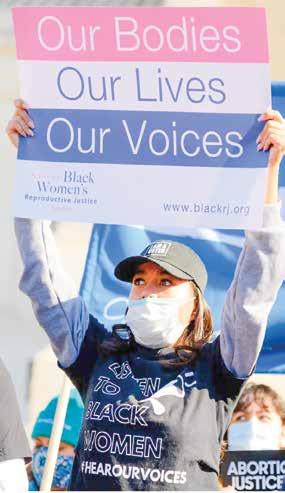
5
By Lindiwe Vilakazi WI Health Reporter
Anticipation is steadily rising as mothers and health advocates alike prepare for the opening of Cedar Hill Regional Medical Center GW Health, located on 1200 Pecan Street SE, on April 15. Located in Ward 8 on the St. Elizabeths East campus, the District’s newest full-service hospital is intentionally designed to combat health disparities, such as maternal mortality, which disproportionately affects African American women.
Ward 8 resident and mother of two Jae-B Love has delivered two children in the District 11 years apart. However, barriers to more accessible, quality maternal health care have been a persistent issue in her community despite the time lapse. Upon delivering both of her children, she knew that traveling outside of her ward would provide better quality care and birthing outcomes for her and her children.
“When I had my son, I didn’t want to go to Greater Southeast (later named United Medical Center),” Love told The Informer. “I knew a lot of people were going to Greater Southeast, but I just knew I didn’t want to go there. I was working at MedStar Washington Hospital Center, the nurses knew me, and I felt that I would receive good treatment there.”
For a long time, families in Wards 7 and 8 have had to manage the challenge of securing quality maternal health care amid facility closures and challenges. Since 2017, the D.C. Department of Heath ordered the closure of United Medical Center’s obstetrics ward due to a series of “dangerous mistakes” made by hospital staff during the care of pregnant women and newborns, and inadequate monitoring and treatment.
Having the benefit of working in the maternity ward of MedStar Washington Hospital Center, Love had witnessed the higher quality of health care provided in the 66-year old hospital. Despite having to travel to Northwest for care, for Love it was an easy choice
when my water broke. She was coming out. I remember being on my knees, looking back out of the window [looking at the] traffic,” she told The Informer.
Despite having United Medical Center in close proximity to her home when she was in labor with her now 5-year old daughter in 2020, the closure of the hospital’s maternity ward left her with no other option than to rush across the Anacostia River for care.
deciding where to deliver children.
However, for many women and mothers raising their families in Love’s community, access to better care across the District is not always a tangible option.
In spite of the nation’s capital having one of the largest economies in the country, the irony behind Black women struggling at such disproportionate rates— particularly amid a national maternal health crisis— peaked the attention of Dr. Alecia McGregor, of the Harvard T.H. Chan School of Public Health. She conducted research in conjunction with Howard University to pin a better understanding of maternal health disparities seen in largely Black communities across the District.
According to McGregor, the research centered in Wards 5,7, and 8, revealed significant access issues, including shortages of obstetricians, birthing rooms, and staff, and the practice of diversion, particularly affecting Black patients.
Policy recommendations included improving Medicaid access and addressing transportation barriers to ensure equitable maternal care.
“We have high and rising rates of severe maternal morbidity, and we have huge racial and ethnic disparities across this. Nevertheless, we see hospital maternity wards steadily closing, often in the most vulnerable communities,” McGregor said in a recent presentation during a local Health Alliance Network meeting at the Dorothy Heights Library in Northeast, D.C.
Transportation persists as a major barrier for mothers when accessing maternity needs.
Timing was certainly of the essence when she went into labor with her daughter. Feeling her water breaking in the early morning, Love attempted to give birth at a community birthing center in Northeast, D.C. But with the center filled to capacity, she was forced to take an Uber to Washington Hospital Center, suddenly finding herself in labor while en route.
“I was giving birth in the Uber
“A lot of mothers don’t have a way to get [to the hospital and back] home. A lot of mothers and their partners are not together after the baby,” Love said. “I was fortunate with both of my births to have my partner there to get us to the hospital, but we still had to spend money taking Ubers to get there.”
With the upcoming opening of Ward 8’s newest hospital, Tony Coleman, chief executive officer of Cedar Hill Regional Medical Center GW Health, is placing significant focus on providing stellar maternity care to Ward 7 and 8, as they prepare for its opening on April 15.
“We have what’s called the Cedar Hill Alliance for Health Equity, where we look at certain ailments that plague the community at a higher rate,” Cole-

man said during a March 3 Health Alliance Network meeting. “Two things that I’m particularly interested in at the outset are maternal health and substance use disorder. So we’re going to be looking at a number of things, but those are the two things that I’m zeroing in on.”
The hospital is slated to have four labor and delivery rooms, two cesarean section rooms, and 14 postpartum and antepartum rooms for observation and recovery.
Love looks forward to the opening of the new medical center, hoping that its presence will bolster economic and health outcomes in her community.
“Having maternal [care here] is a plus, we need that, because they shut down everywhere else so we have to travel far,” Love explained. “There are a lot of young girls who are getting pregnant early, and they often don’t have their partners there with them. So it’ll be good that this is close and we can get there easier.” n
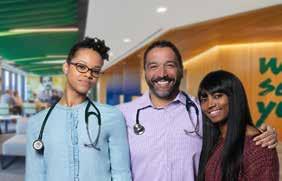
WOMEN’S WELLNESS:

By Lindiwe Vilakazi WI Health Reporter
Like a tale as old as time, some degree of trauma and pain is an inevitable fact of life. However, no matter if mental or physical, trauma affects the body.
“The Body Keeps The Score: Brain, Mind, and Body in the Healing of Trauma” (2015), authored by Boston-based psychiatrist Bessel van der Kolk, M.D., offers eye-opening insight on understanding traumatic stress and its
impacts on the body.
The author dissects the impact of mental, emotional, and behavioral disorders on physical well being.
Similar to van der Kolk’s work, Bold Yoga, LLC utilizes the ancient practice of yoga to help rid much of the physical tension and upheaval that traumatic stress has caused in women and community members.
Charnal Chaney (CC), a trauma informed yoga instructor and founder of Bold Yoga, LLC, and partners India Johnson (IJ), and Amani Mamodesene (AM), em-
phasized the healing abilities of yoga and why the practice is so instrumental to restoring health.
Did you know, according to van der Kolk’s research, yoga can reduce physiological arousal in PTSD patients, while also believed to improve somatic regulation and body awareness?
CC: “Us as women, we not only hold trauma in the body, but we hold it in our wombs. There are scientific studies that show that we hold trauma in our wombs up to 14 generations. So, the release of doing hip stretches, the somatic practices, dance, anything that requires you to move the hips where we [often] store our trauma definitely helps you release [it].
disrupted. And if that’s happening [chronically], that’s where PTSD comes from. So releasing those emotions is so helpful in general, to our mental health and well-being.”
Did you know that postpartum yoga offers numerous benefits for new mothers, including reduced anxiety and depression, increased calmness, improved energy levels, while also aiding in muscle recovery and relaxation?
IJ: “[Yoga is] a way to reconnect with your body after it has gone through so many changes throughout [your pregnancy]. It’s a way for you to come back to gratitude, and awareness for the new space you are in now, while also bringing you around other people.
Health benefits
} Doctor visits, shots, and checkups
} Medicines — brand name and generic
} Dental care
} Eye care*
} Hospital stays
} Urgent and emergency care
} Maternity care
} Durable medical equipment, prosthetics, and disposable medical supplies
} Home healthcare
} Physical, occupational, and speech therapy
} 24-hour Nurse HelpLine
* For DC Healthy Families Program and Immigrant Children’s Program enrollees
visit us online or call us.
Extra benefits
} Free Boys & Girls Club memberships for kids 6–18 at Boys & Girls Clubs of Greater Washington (District of Columbia locations only)
} Free YMCA and Boy and Girl Scouts of America memberships for kids
} Baby and Toddler Essentials such as a convertible car seat, portable crib, diapers, safe sleep kit, halo sleep sack, soothie pacifier, infant sleep guidelines and education, and baby monitor
} Over-the-counter drugs and supplies: options include, but are not limited to, cold and allergy remedies, baby care, first aid, eye care, pain relievers, adult supplies, and feminine care products
} GED test vouchers
} Capital Bikeshare Passes
} Rides to community services
} Digital Mental Health Toolkit
} Employment and education support
} Amerigroup DC Community Resource Link
— search for free and low-cost community services by ZIP code
} Voice language translator
“That’s why somatic yoga is really helpful for us in our community. When you look at our PTSD, our anxiety, it’s also the nervous system that is affected [by it]. Anytime something traumatic happens, like a fight, a shooting, or anything of that nature, our nervous system is
“When you become a new mom, you’re going to be in the house most of the time. So, being able to come out and have that sense of community and some type of wellness activity is beneficial. I’ve seen
BODY, HEALING PAGE HS-5
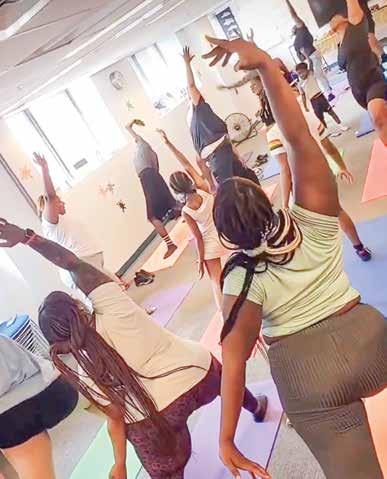

it help mothers, and it was what helped me as well, helping me reconnect and be more of a present mother, myself.”
Did you know that while the earliest mentions and practices of yoga appear in ancient India, some researchers and practitioners explore the possibility of Kemetic yoga, or ancient Egyptian yoga, as a precursor to modern yoga practices with roots in East Africa?
AM: “People tie it so much to Hinduism because it’s practiced so heavily in India. But, if you actually trace that, even the roots of yoga, its earlier roots are in Africa, [specifically] East Africa.
“With yoga, it’s so fascinating because some of these poses that have been passed down from generations, now store information in the specific posture that you’re in. [Similar to] African dance, sometimes your body just knows how to dance, because we have African dance, indigenous tribal dances, that are already stored in the information of your body from generations before. So, this
new information that your body is restoring into the body is information of joy, information of love, information of peace that’s been passed on from generations before. So, allowing your body to move into that helps to override the fear, and the trauma that is stuck inside.”
Did you know that there are various stigmas attached to the practice of yoga, such as it being a feminine practice or having to fit in a certain weight class?
AM: “Sometimes there is the stigma that yoga is a more feminine [practice], in our communities [seeing mostly] women [practice it]. But really, all my yoga teachers, everyone that I’ve learned from so far in yoga have been men.
“Yoga is for everybody. And nowadays, a lot of athletes are doing yoga because it helps ensure that they are stretching and preventing injury in their body.”
CC: “ It doesn’t matter how big or small you are. If you’ve never done it, you will be starting from square one. So, the more you do it, the more flexible you will become.” n

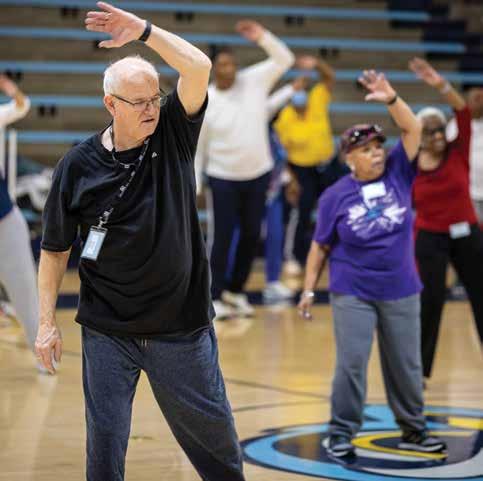
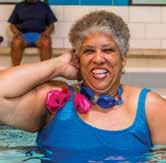
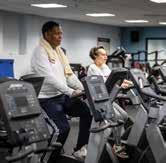
PGCC’s SAGE program offers classes for seniors ready to stay fit or sharpen their skills. Enjoy strength training, dance, computer skills, and more—all for just $40 per class.
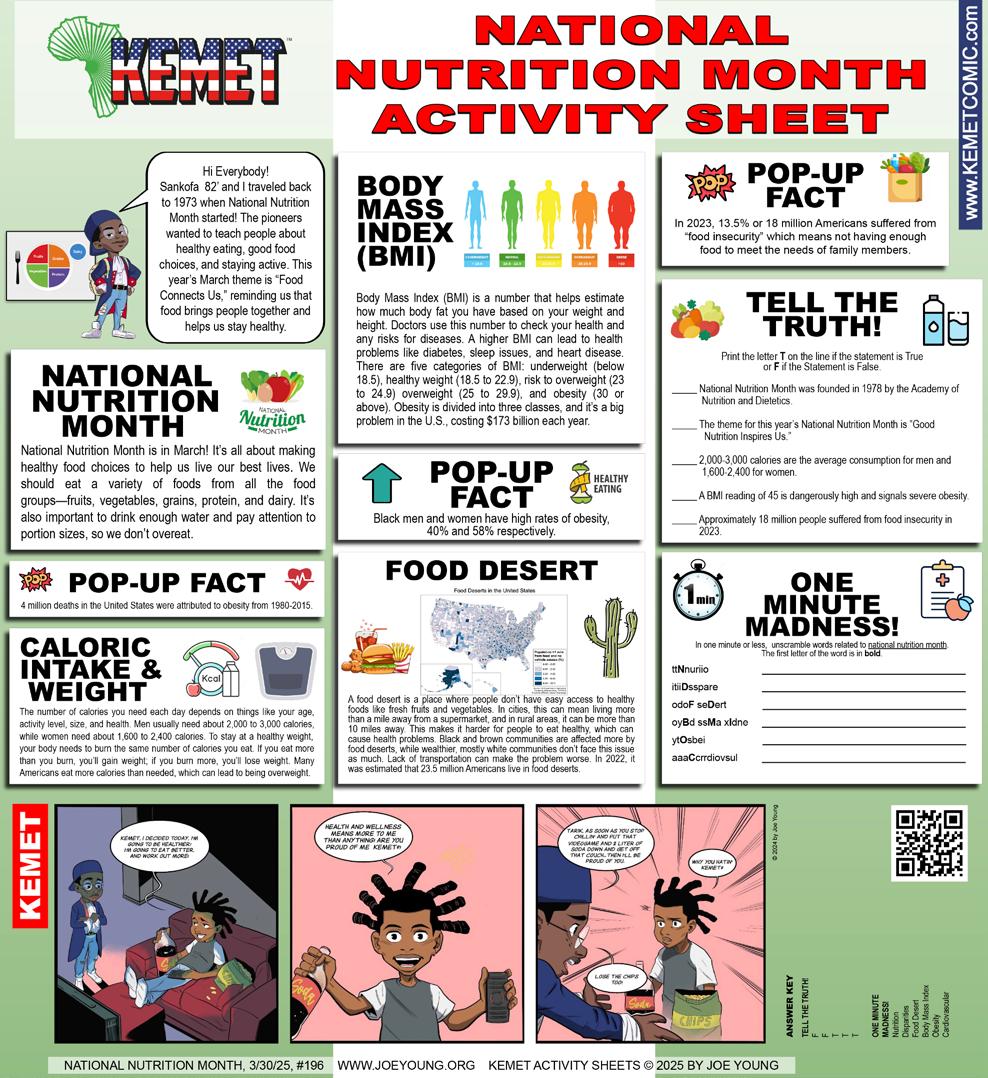
By Lindiwe Vilakazi WI Health Reporter
Often women’s health is critically important to their own livelihoods and contributes to their ability to take care of their family, community members and more. From ancient civilizations to today, women health practitioners, healers, and educators have remained paramount to the sustainability and wellness outcomes seen within Black communities.
While major entities of health care in the District stand as the linchpin of care to local residents, independent health professionals and advocates have made major contributions toward the health and well-being of people and families across the D.C. metropolitan area.
In celebration of Women’s History Month and The Washington Informer’s 60th anniversary, the publication is highlighting a few leading ladies over the age of 60 who are dedicated to pouring their love, encouragement, and healing into local communities and beyond.
Ayo Handy-Kendi: Healing The Community One Breath At A Time
In a world full of highs and lows and life’s trials, Ayo Handy-Kendi found her centering and eventual calling of service when she learned to tap into one of the most transformational antidotes known: the power of the breath.
Lovingly referred to as “Mama Ayo,” the renowned “breath sekou” or breath master teacher has more than 50 years of experience in working to advance wellness, culture, and community development. Breathing with scores of people through various mediums, on stage, and in private practice, Handy-Kendi, 73, has left an indelible mark on those who found themselves with the great privilege to learn and heal under her tutelage.
Among her many successes and breakthroughs teaching transformational breathing, reiki, laughter yoga and more, Handy-Kendi is also the brains behind Black Love Day, a community-based celebration. Uplifting the beauty of Black love, the day focuses on Handy-Kendi’s five tenets of loving acts that strengthen people’s capabilities of self-love, connection with the creator,
family, and others.
Known as an absolute jewel of her community, Handy-Kendi has opened the pathway to enlightenment, while evoking an emotional catharsis through breath that has forever changed the lives of many - and she hasn’t stopped yet.
“I truly believe we all have come here with a purpose and that we can get lost from that purpose for a lot of different reasons,” Handy-Kendi told The Informer. “For me, the work with breathing helped me find that spiritual connection again.”
Mary Douglas-Brown: Pink With A Purpose
Mary Douglas-Brown has spent the last 17 years of her life giving back to the very community she found herself in upon receiving a stage 2 breast cancer diagnosis in 2004. Throughout the course of her treatment, ample time spent in support groups became the inspiration behind the inception of her own safe space for women struggling with the emotional toll of breast cancer.
A woman of great faith, Douglas-Brown, 74, serves as the health coordinator at Pilgrim Rest Baptist Church of Northeast, D.C., uplifting the spirits of numerous women across the District who are embarking on their personal journey against the disease she faced more than 20 years ago.
Pink is more than a cute color for Douglas-Brown to don, it’s a sign of strength. Adorned in hues of pink from her pixie cut, to her everyday accessories, her love of the radiant color pays homage to women fighting the battle, while celebrating her success of remaining cancer free.
Today, her support group continues to build a growing sisterhood across the District, while she additionally pours into community members through local health fairs in efforts to connect residents with resources.
Countless women thank Douglas-Brown for being their angel in a time of uncertainty, saving numerous ladies’ lives with her “blueprint for wellness,” and supporting services to the breast cancer community.
While she sees herself as just a humble servant to those in need, she believes that, “God puts his people in places.”
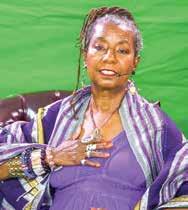
5 Ayo Handy-Kendi is a renowned breath master teacher with more than 50 years of experience in working to advance wellness, culture, and community development. (Courtesy Photo)
“I guess that’s where I am at my church,” she told The Informer. “[I am here] just to really help and to be a blessing to somebody.”
Sharon Robinson Goods: Climbing to Higher Heights
Sharon Robinson Goods has reached many heights in her life as a well-respected public relations professional and health advocate who spent years as a yoga instructor.
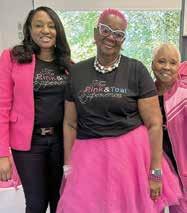
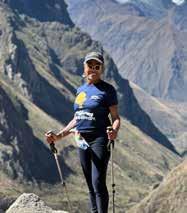
5 Mary Douglas-Brown (center) serves as the health coordinator at Pilgrim Rest Baptist Church of Northeast, D.C., uplifting the spirits of numerous women across the District who are embarking on their personal journey against breast cancer. (Courtesy Photo)
While powering through her journey of physical fitness, witnessing increasing rates of African American women suffering from strokes and hypertension and seeing a beloved niece struggle with health, Goods offered an added motivation to help others.
Leading with the knowledge that sweat is the best form of medicine, Goods, who is proudly over 70, began holding local walks in Rock Creek Park with just a few ladies in her group to
encourage exercise and strong health outcomes.
Goods’ vision quickly grew from local walks in the park with her peers to international treks, including a 10-day climb of Mount Kilimanjaro amid a tour to the beautiful lands of Tanzania and Zanzibar in 2022. In her claim three years ago, the public relations and health expert made history as the oldest Black woman to ever summit the iconic landmark.n
Read more on washingtoninformer.com.

• 27 plans to meet every need & budget
• Free expert enrollment help
• Plans as low as $13/month depending on household income
DON’T MISS YOUR CHANCE TO ENROLL
You must sign up within 60 days of when your employer health coverage ends.
Written by Safeway Sincerely Health
Your immune system is your body’s primary defense against bacteria, viruses, and other germs. Various conditions, such as diabetes and cancer, can affect how well your immune system works. Your body’s immune response and ability to fight off germs also diminishes as you get older.
Many of us pay more attention to our immune systems during cold and flu season. But germs lurk everywhere, which is why it’s important to never let down your guard. Regardless of the time of year, there are many steps you can take to give your immune system a boost.
Choose immune-boosting foods
Eating a balanced diet that provides key nutrients is important for overall health. Certain foods are more nutrient-dense, meaning they provide your body with high amounts of vitamins and minerals.[6]
Some foods have more immune-boosting powers than others. For a strong immune system, consider stocking up on these nutrient-rich foods:[7]
• Beef, pork, poultry, and shellfish for zinc
• Berries, citrus fruits, and red peppers for vitamin C
• Carrots, sweet potatoes, and dairy products for vitamin A
• Nuts, nut butters, and sunflower seeds for vitamin E
• Salmon, seafood, and avocados for omega-3 fatty acids
• Fortified cereals, juices, dairy products, and nondairy products for vitamin D
Get vaccinated
Vaccinations help boost your immune system by teaching it how to combat certain viruses or bacteria. Antigens in vaccines cause the immune system to make antibodies. These proteins in white blood cells help identify and detect specific viruses or bacteria. When you’re exposed to a germ later, the immune system seeks it out and destroys it, so you’re less likely to get sick.
Check with your healthcare provider to make sure you’re current on vaccinations. Your provider may recommend certain vaccinations, such as the flu vaccine and COVID-19 vaccine, every year.
Manage stress
Your body makes more cortisol when you’re stressed. This hormone helps fight inflammation, which is a good thing. But chronic stress can keep cortisol levels high. Too much cortisol can lead to inflammation and suppress your immune system’s ability to fight germs. Prolonged inflammation increases your risk of chronic diseases, such as heart disease, arthritis, and autoimmune diseases.
Activities that support your mental health, physical health, or both can help lower stress levels. You can try:
• Walking or other physical exercise
• Meditation, mindfulness, or yoga
• Participating in a hobby like gardening or singing
• Talking to a loved one
Be physically active
Exercise promotes good circulation, helping to move disease-fighting antibodies and white blood cells throughout your body. It also eases stress, slowing the release of cortisol. Plus, being physically active can help you maintain a healthy weight. Excess weight and obesity can cause inflammation that strains your immune system.
The CDC recommends Americans get 150 minutes of moderate-intensity activity per week.[37] You can spread that out to 30 minutes of exercise 5 days a week or whatever works best for your schedule.
In summary: Dietary and lifestyle choices are year-round immunity boosters
A combination of healthy dietary and lifestyle choices can help naturally boost your immune system. These actions can keep your immune system working as it should every day of the year, helping to prevent illness and aiding recovery from illness or injuries.
Now that you know more about how to boost your immune system year-round, you may be curious about how to make smart shopping choices.
The Sincerely Health nutrition tools in the Safeway app can help.
You can start by downloading the Safeway app. You’ll save $10 on groceries* for creating an account. Next, create a personalized Sincerely Health nutrition profile to receive 1,000 points*.
Your nutrition profile allows you to:
• Set specific nutrition goals.
• Earn 10 points for items you purchase for a maximum 100 points per order (that’s 10 items at 10 points each).*
Sign up for Sincerely Health and create a nutrition profile to help you get healthy today!
Download the Safeway app on the App Store today
The content on this page is for informational and educational purposes only and should not be relied on as medical advice. This information is not intended to be a substitute for professional medical advice, evaluation, or treatment of a qualified health-care provider.
*Sincerely Health offers: See rewards account for offer dates and minimum purchase requirements. Only valid on groceries. Excludes alcohol, tobacco, fluid dairy, stamps, gift cards, tickets, concession passes, taxes, service and regulatory fees & tips. Limit 1 per Health Account. Cannot be combined with any other offer. Not valid for orders placed with third party delivery providers like Instacart, DoorDash, UberEats. No monetary value. We reserve the right to correct or modify/cancel the offer. n

“LiveLongDC” to 888-811
Text “Li veLongDC” t o 888- 81 1 f or nal oxone, f ent anyl t est st ri ps, or servi ce l ocat i ons.
For cri si s ment al heal t h or subst ance use servi ces, cal l 98 988.
Vi si t t he Di st ri ct ’ s new St abi l i zat i on Cent at 35 K St reet NE f or i mmedi at e 24/7 care i n a saf e envi ronment f or peopl e wi t h subst ance use di sorder

For connect i ons t o care, cal l t he ccess Hel pLi ne at Access HelpLine
Fi nd servi ces or support s by Ward: myrecoverydc.org/services-by-ward
combats the opioid epidemic by mobilizing the community with strong interagency coordination, community input, and a range of direct services and supports for individuals dealing with substance use disorders.
To request t rai ni ng f rom a cert i f i ed nal oxone t rai ner f or groups of 1 0 or more, e- mai l : naloxone@dc.gov
For cl ean- up of drug paraphernal i a or syri nge servi ces, e- mai l : syringe.cleanup@dc.gov
To l earn more, cal l Stabilization Center 202- 839- 3500 or vi si t dbh. dc. gov. or 1 - 888- 793- 4357. 1-888-7WEHELP

Scan here t o access a f ree, onl i ne nal oxone t rai ni ng modul e



Submitted by AmeriHealth Caritas District of Columbia (DC)
March is an important month for women’s health and empowerment as we observe International Women’s Day on March 8 and National Women and Girls HIV/AIDS Awareness Day (NWGHAAD) on March 10. These observances are a time to reflect on the progress made toward women’s rights. They also address ongoing health challenges, particularly the impact of HIV/AIDS on women and girls.
The importance of NWGHAAD
Established in 2005 by the U.S. Department of Health and Human Services’ Office on Women’s Health, NWGHAAD aims to raise awareness about the impact of HIV/AIDS on women and girls.1 This day focuses on the importance of HIV prevention, testing, and treatment, encouraging women and girls to take charge of their health.
In the United States, women ac-
count for about 22% of people living with HIV. Nineteen percent of new diagnoses in 2022 were women.2 These statistics highlight the ongoing need for specific prevention and education efforts for women and girls in the United States.
Women, especially those from marginalized communities, face unique challenges in HIV prevention and care. Stigma, socioeconomic factors, and limited access to healthcare can hinder efforts to reduce HIV from spreading.3 Addressing these barriers requires culturally sensitive approaches and community engagement.
Advances in HIV testing, treatment, and prevention have led to significant progress toward ending the HIV epidemic. Initiatives like pre-exposure prophylaxis (PrEP) are one of the most important advancements in HIV prevention, helping to protect women and girls who may be at risk for the virus.
PrEP is a daily prescription medication that can reduce the risk of getting HIV from sexual contact by up to 99%.4 However, continued efforts are necessary to ensure these advancements reach all women, particularly those in underserved populations.
Taking action: What can be done?
Taking action to prevent HIV and AIDS starts with empowering yourself and your community through education, advocacy, and access to the appropriate resources:
• Education and awareness. You can educate yourself and others on HIV transmission, prevention, and treatment options and share this information to combat stigma and promote HIV and AIDS awareness.
• Regular testing: Regular HIV testing is one of the most important steps toward prevention and early treatment. Encourage friends and family to get tested as well.
• Practice and promote safe behaviors. Encourage practices like using

Earn $25 in gift card rewards from popular retailers when you complete a prenatal visit with your OB/GYN or midwife before you are 13 weeks pregnant.






protection, discussing HIV status with partners, and following treatment plans if living with HIV.
• Improve access to care. Help connect women and girls to healthcare providers and programs that offer affordable or free services, including HIV testing, treatment, and counseling.
As we observe International Women’s Day and Women’s History Month, it is important that we understand that without intentional actions, prevention efforts will continue to fall short on this public health issue. Together, we can work towards a future where HIV/AIDS is no longer a threat to women’s health.
Sources
in-the-united-states/#:~:text=Overview,older%20ages%20than%20 men%20are.
3.“The Impact of HIV on Black People in the United States,” KFF.org, https://www.kff.org/hivaids/fact-sheet/ the-impact-of-hiv-on-black-people-inthe-united-states/
4.“Pre-Exposure Prophylaxis,” HIV. gov, https://www.hiv.gov/hiv-basics/ hiv-prevention/using-hiv-medication-to-reduce-risk/pre-exposure-prophylaxis#:~:text=PrEP%20is%20highly%20effective%20at,it%20isn’t%20 taken%20consistently.
5.“Grief,” Cleveland Clinic, https://my.clevelandclinic.org/health/ diseases/24787-grief
1.“National Women and Girls HIV/ AIDS Awareness Day,” National Institutes of Health, HIVinfo, https://hivinfo.nih.gov/understanding-hiv/hiv-aids-awareness-days/national-women-and-girls-hiv-aids-awarenessday
2.“The Impact of HIV on Women in the United States,” KFF.org, https://www.kff.org/hivaids/factsheet/the-impact-of-hiv-on-women-

6.“Bereavement and Grief,” Mental Health America, https://www.mhanational.org/bereavement-and-grief
1.https://www.cdc.gov/heart-disease/ data-research/facts-stats/index.html.
All images are submitted by AmeriHealth Caritas District of Columbia and are used under license for illustrative purposes only. Any individual depicted is a model n
Grief is one of the most difficult experiences in life. It can bring up many emotions that affect how we deal with loss or change, and how we go about our daily lives. There is no “right” way to grieve; coping with loss takes time and patience. Getting help from professionals can make this journey easier.
Grief is the experience of coping with loss.5 Whether it’s the death of a loved one, the end of a relationship, or the loss of a home, grief affects everyone in different ways. Some emotions associated with grief can be:6
• Anger
• Sadness
• Denial
• Guilt
• Shock
• Disbelief
Nourishing your mental health
• Depression
Every day, millions of people face the challenges of loss, making it crucial to nurture mental health and develop resilience in tough times. AmeriHealth Caritas DC enrollees can access mental health and behavioral health services to help them navigate these difficult times:
• Emotional support services via text. Enrollees can chat live with trained behavioral health coaches through the Headspace Care and MindRight apps to help discuss any life challenges. If you are age 21 or older, download the Headspace Care app from the Google Play store or Apple App Store. Enrollees ages 12 – 30 should text 886-886 and use the referral code “AmeriHealth” as they enroll in MindRight and begin texting with a support coach.
• 988 Suicide & Crisis Lifeline. The 988 Suicide & Crisis Lifeline provides confidential emotional support to people in suicidal crisis or emotional distress 24 hours a day, seven days a week at no cost.
• For additional emotional support for you, your child, or a family member, call Enrollee Services at 202-408-4720 or 1-800-408-7511 to be connected with a behavioral healthcare provider.

